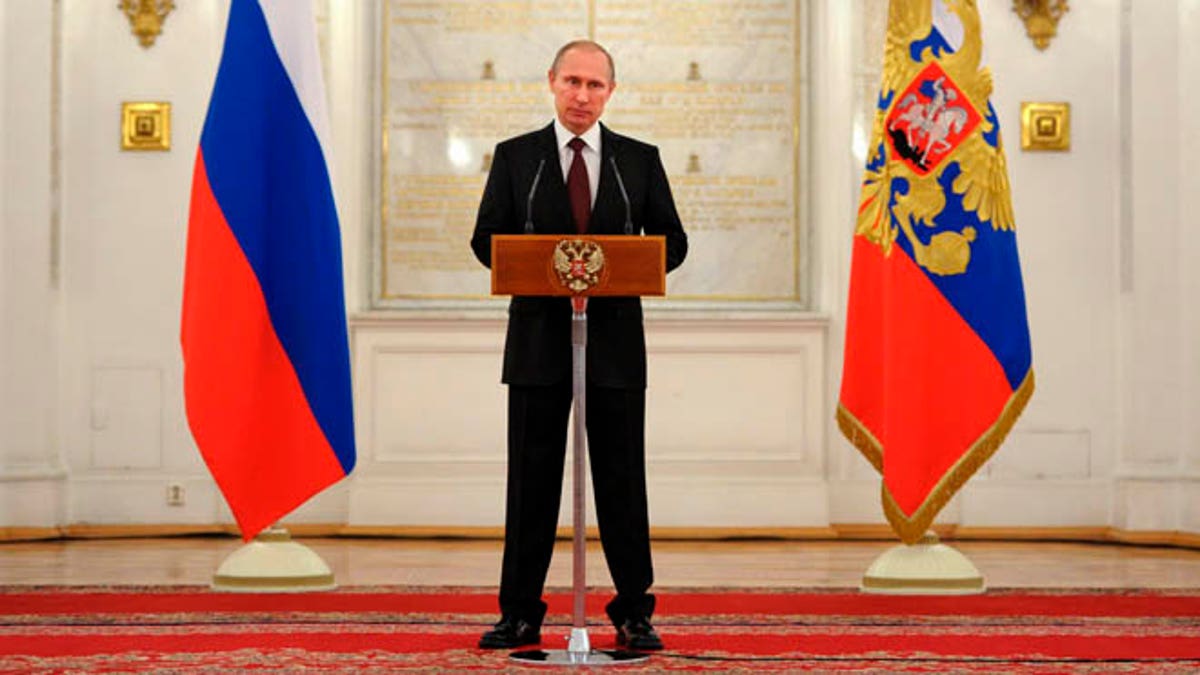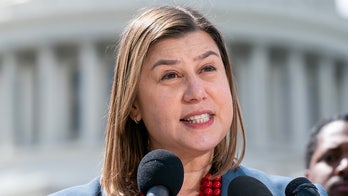
March 28, 2014: Russian President Vladimir Putin speaks in the Kremlin in Moscow. (AP)
U.S. officials are assailing the Russian government for shutting down Voice of America's radio broadcasts in Moscow, in a move that marked a dramatic escalation of the message war between the two governments amid the Ukraine conflict.
The U.S. government-backed radio broadcast had been operating from a local frequency in Russia's capital for years. But Dmitry Kiselev, the director of the information agency Rossiya Segodnya (Russia Today), informed Voice of America late last month it would "not cooperate" with a U.S. request to renew its license.
According to Russian media, he dismissed U.S. and other radio stations as a "spam on our frequencies."
State Department spokeswoman Jen Psaki on Friday condemned the decision and accused Russia of hypocrisy for defending free speech in other countries, but not their own.
"We call on them now to drop this obvious double standard, and allow the same access to information for their people that it insists other nations provide," she said.
Asked Friday if the U.S. would reciprocate by shutting down Russia outlets in the U.S., Psaki said the U.S. would not -- because of a belief in free media.
The Russia media decision has hardened the stand-off between Vladimir Putin's government and the West over the annexation of the Crimean Peninsula and troop build-up on the Ukraine border. U.S. officials argue that the Russian government has increasingly frozen out media and online publications, while ignoring harassment of and attacks on journalists in the country.
The U.S. Embassy in Russia issued a scathing statement, saying the license denial is "particularly ironic" since Russian officials were just denouncing a Kiev court for allowing the suspension of Russian broadcasts in Ukraine.
"We call on the Russian government to allow the same access to information for their people that it insists other nations provide," the U.S. Embassy said.
Diplomatic officials are stepping into the fray after Russia's media infrastructure tangled days earlier with the U.S. Broadcasting Board of Governors, which oversees Voice of America.
"Moscow has chosen to do the wrong thing and restrict free speech," BBG Chairman Jeff Shell said in a statement.
According to the BBG, distribution of Voice of America and other related programming reached a "high point" in Russia in 2005. But the Russian government then started asking U.S. stations to reapply for their licenses, and began denying them.
Shell noted that while Russia cracks down on U.S. outlets, Russian media including Russia Today enjoy "open access" in the United States.
According to Russia Today, Kiselev denied the decision to end the Voice of America contract had "anything to do with the freedom of speech."
He reportedly said that Voice of America and one other station in question "have nothing original to say."
U.S. officials noted that the license decision is part of a broader pattern, where the Russian government has passed laws "imposing unprecedented censorship and restrictions on media and online publications."
This includes blocking independent websites and blogs, and denying visas to foreign journalists.
Despite the license denial, Radio Free Europe/Radio Liberty's Russian Service still offers radio programming over the Internet and satellite.




